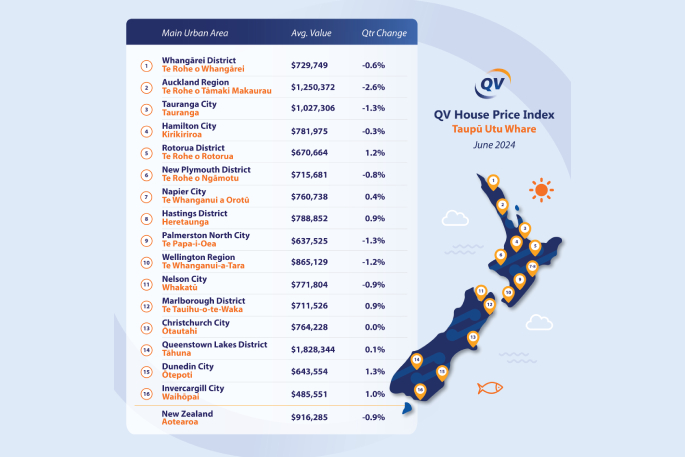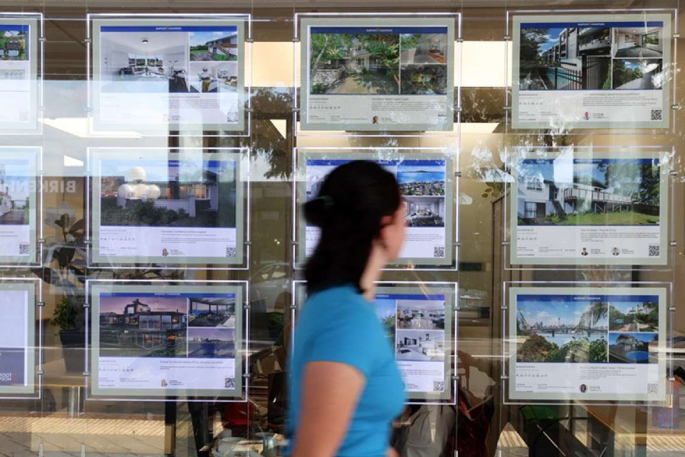Frosty economic conditions continue to impede New Zealand Aotearoa’s now ice-cold housing market, causing home values to dip with the temperature in most main centres.
The latest QV House Price Index shows home values decreased by an average of 0.9 per cent nationally over the three months to the end of June 2024 – a slightly larger rate of reduction than the 0.2 per cent quarterly decline for May – with the average home value now sitting at $916,285.
That figure is still 2.8 per cent higher than last year and 13.9 per cent ($147,480) lower than the market’s peak in late 2021.
Tauranga
The rate of home value decline has remained relatively steady in Tauranga this quarter.
The QV House Price Index for June 2024 shows the city’s average home value reduced by 1.3 per cent to $1,027,306 this quarter – down from a three-month average rolling rate of 1 per cent negative growth in our previous index.
The city’s average home value is now 0.8 per cent lower on average than at the start of this calendar year, but still 2.9 per cent higher than at the end of June last year.
 QV House Price Index. Photo supplied.
QV House Price Index. Photo supplied.
Once again, Auckland lead the reductions with a 2.6 per centaverage home value decline this quarter – down from a 1.4 per cent decrease in our previous index, and marking five straight months of negative growth.
Tauranga (-1.3 per cent), Palmerston North (-1.3 per cent), and Wellington (-1.2 per cent) experienced the next largest home value reductions on average this quarter.
Marlborough (0.9 per cent) was the only main urban area we monitor where the average rate of home value growth increased this quarter.
The rolling three-month average remained steady from index to index in Hastings (0.9 per cent) and Queenstown (0.1 per cent), and it either decreased, or the rate of decline increased, everywhere else.
QV operations manager James Wilson highlighted the relative strength of home values in the South Island, particularly around Invercargill (1 per cent) and Dunedin (1.3 per cent).
“There are some pockets of modest growth, most notably in the South Island. However, that also appears to be waning now, with even Christchurch and Queenstown – two of our more ‘bullish’ housing markets in recent years – now experiencing little or no growth whatsoever,” he says.
“Tough economic conditions are continuing to make it extremely difficult for potential purchasers to save a sizeable deposit for a home, secure finance from the bank, and service a mortgage with interest rates currently sitting around 7 per cent and on shore inflation still biting.
“Many house hunters are in hibernation now until conditions improve, potentially on the other side of winter, maybe longer.
“As a result, downward price pressure has spread across all segments of the market now, with investors, owner occupiers, and even first-home buyers – still the most active group in the market today – all taking a noticeable step back as we pass the halfway point of the year.
“An abundance of listings is also having a cooling effect on the market, reducing remaining competition and therefore flattening growth across much of the country.”
Meanwhile, Mr Wilson says sellers were having to be increasingly patient. “Many residential property sales are now conditional on other sales occurring.
“This has been causing chain reactions in many instances, which is often extending sales periods or causing deals to fall over altogether.
“Sellers are also having to adjust their price expectations in what has increasingly become a buyers’ market, albeit a pretty quiet one.”
Mr Wilson expected home values to soften further throughout the winter months ahead.
“There’s currently nothing to suggest that house prices will take off again in the near future, while there’s everything to suggest that they will remain flat to gently falling.
“The recent shortening of the bright-line test will likely result in more listings coming onto the market, offering buyers even more choice and therefore keeping downward pressure on prices.”
“The recent introduction of debt-to-income restrictions and the loosening of loan-to-value ratios are not expected to have any material effect on the market in the short to medium term, particularly while interest rates remain at their current high level,” he says.



0 comments
Leave a Comment
You must be logged in to make a comment.